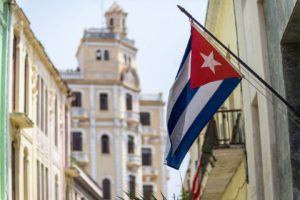
The U.S. State Department said Friday that it is eliminating the five-year tourist visa for Cubans, dealing a heavy blow to entrepreneurs and members of divided families, who used the visas to see relatives in the United States and buy supplies for their businesses on the island.
“This affects every Cuban but especially entrepreneurs who have to travel to get products that don’t exist here,” said Niuris Higueras, who brings salt, hand towels, candles and other products from the U.S. for her restaurant Atelier, one of Havana’s most successful private eateries.
The elimination of the visa cuts a vital link between the U.S. and Cuba by forcing Cubans to make a costly and complicated trip to a third country like Mexico or Panama every single time they want to visit the U.S. That’s because the U.S. withdrew most of its non-essential diplomatic staff from Havana in September 2017 and stopped issuing visas of almost any type in Cuba.
Until now, Cubans who saved the money and mastered the complexities of successfully applying for a visa in a third country would receive a visa eliminating the need to apply again for another five years. That possibility will disappear starting today March 18th, when the B2 visa will only allow a single entry for a three-month stay, Mara Tekach, the U.S. Embassy’s charge d’affaires, said in a video posted on Facebook Friday.
Tekach said the change was due to the need to achieve reciprocity between the visa rules of the U.S. and Cuba, which issues Americans single-entry tourist visas allowing a stay of up to three months. However, the Cuban visa “application process” is a formality, with airlines and travel agencies authorized to hand out visas to anyone who requests one and pays $50 as part of the purchase of an airline ticket or travel package.
Cubans must pay $160, plus airfare and hotel costs in a third country, often to see their visa application swiftly rejected. The change in visa rules in fact is one of the harshest measures against Cuba taken by the Trump administration because of the effect it will have on the informal supply chain for the communist-run island’s small but vibrant private sector.
Virtually all of the supplies used by Cuban entrepreneurs from barbers to restaurant owners are either stolen from state enterprises or brought in suitcases from capitalist countries by business owners or “mules,” couriers with visas who are paid to haul in the hundreds of varieties of products unavailable in Cuba’s stagnant, centrally planned economy.

Recent Comments